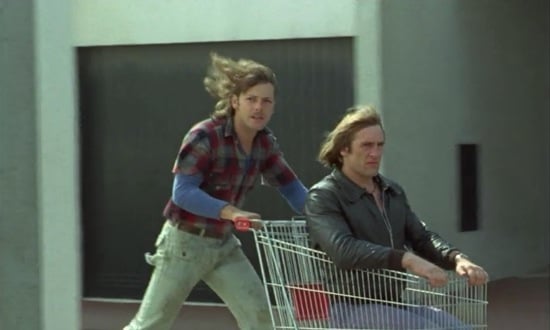Shocking Blocking (26)
By:
December 10, 2011

The triumph of the paranoid theory that social control is exercised less through class domination than through infinitely more subtle mechanisms marks the end of the Sixties (1964-73). Though Baudelaire, Philip K. Dick, and others had already suggested as much, two 1972 French texts in particular paved the way for the Seventies era (1974-83): Deleuze and Guattari’s L’Anti-Œdipe, which argued that if Westerners have been trained to desire their own repression at home, at school, and at work, then the agent of social revolution was to be found not in the working class but among the unnormalized, the shiftless, and the crazy; and Bertrand Blier’s nobrow picaresque novel, Les Valseuses, in which two loubards (louts) steal cars, assault women, and in various other ways take their desires, as the Situationists had urged, for reality. Two years later, Blier’s feature film adaptation of the book (whose title is slang for “testicles”) was a succès de scandale in France; and it made Gérard Depardieu a star. The blocking in the opening scene captures the neither-heroic-nor-antiheroic nature of Jean-Claude (Depardieu) and Pierrot (Patrick Dewaere); they are half-wild denizens of “la zone” on the outskirts of a large town, contemptuous of work and workers. As Pierrot pushes him around in a shopping cart, Jean-Claude keenly tracks his prey — a woman whom they will harass and rob — like the feral predator he is.
An occasional series analyzing some of the author’s favorite moments in the positioning or movement of actors in a movie.
THIRTIES (1934–1943): It Happened One Night (1934) | The Man Who Knew Too Much (1934) | The Guv’nor (1935) | The 39 Steps (1935) | Young and Innocent (1937) | The Lady Vanishes (1938) | Mr. Smith Goes to Washington (1939) | The Big Sleep (1939) | The Little Princess (1939) | Gone With the Wind (1939) | His Girl Friday (1940)
FORTIES (1944–1953): The Diary of a Chambermaid (1946) | The Asphalt Jungle (1950) | The African Queen (1951)
FIFTIES (1954–1963): A Bucket of Blood (1959) | Beach Party (1963)
SIXTIES (1964–1973): For Those Who Think Young (1964) | Thunderball (1965) | Clambake (1967) | Bonnie and Clyde (1967) | Madigan (1968) | Wild in the Streets (1968) | Barbarella (1968) | Harold and Maude (1971) | The Mack (1973) | The Long Goodbye (1973)
SEVENTIES (1974–1983): Les Valseuses (1974) | Eraserhead (1976) | The Bad News Bears (1976) | Breaking Away (1979) | Rock’n’Roll High School (1979) | Escape from Alcatraz (1979) | Apocalypse Now (1979) | Caddyshack (1980) | Stripes (1981) | Blade Runner (1982) | Tender Mercies (1983) | Monty Python’s The Meaning of Life (1983)
EIGHTIES (1984–1993): Repo Man (1984) | Buckaroo Banzai (1984) | Raising Arizona (1987) | RoboCop (1987) | Goodfellas (1990) | Candyman (1992) | Dazed and Confused (1993) |
NINETIES (1994–2003): Pulp Fiction (1994) | The Fifth Element (1997)
OUGHTS (2004–13): Nacho Libre (2006) | District 9 (2009)
Joshua Glenn’s books include UNBORED: THE ESSENTIAL FIELD GUIDE TO SERIOUS FUN (with Elizabeth Foy Larsen); and SIGNIFICANT OBJECTS: 100 EXTRAORDINARY STORIES ABOUT ORDINARY THINGS (with Rob Walker).
